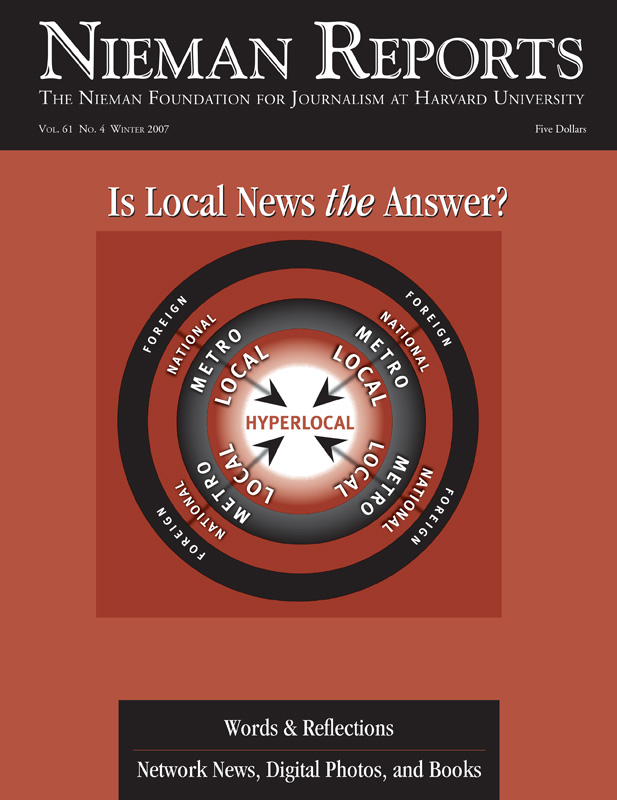For those seeking to venture into the hyperlocal sphere—whether affiliated with a news organization or not—we’ve developed tips through observation and study. —J.S.
1. Get ready for a high-touch experience: Citizen journalists won’t join the effort unless cajoled, recruited, trained, stroked, celebrated and sometimes paid. Content wranglers must be evangelists, cheerleaders, assignment editors, and writers. Travis Henry, top editor of YourHub.com in Denver, has taken local contributors to Broncos’ games and made house calls to teach someone how to load to the site. In Dutton, University of Montana journalism students coauthored early stories with local contributors to help build confidence. And when MyMissourian.com founder Clyde Bentley discovered that a local bluegrass band got a grant to go to China, he “gave them an old computer, set them up a blog and a Flickr account.” They sent e-mails, and he posted what they sent. “We got incredible readership on this thing, and we all saw more of China than we ever would,” he explained.
RELATED WEB LINK
The Forum
– forumhome.org/2. Understand contributors’ motivations. Robust user-generated content demands a measure of equilibrium between the giving and the getting. Volunteers will write or report if they are getting something in return. What motivates them? They might want to learn technical skills or get a job as a journalist, make a difference in their community or solve a problem. Said one citizen reporter for The Forum in Deerfield, New Hampshire: “My experience working as a Forum reporter has been one of the best experiences of my life. At times, I feel used, overworked and run out of words in my head to place on the screen. But it is all worth it in the end.”
3. Model content: Seed the site with the kind of stories you hope others will contribute. Write a mission statement. BlufftonToday.com promises to provide a “friendly, safe, easy to use place” on the Web for people to post and share. “In return, we ask that you meet this character challenge: Be a good citizen and exhibit community leadership qualities. It’s a simple and golden rule. Act as you would like your neighbors to act.” “We’ve had almost no complaints about inaccurate information,” said iBrattleboro cofounder Lise LePage. “Citizen journalism is always going to be advocacy. They attend a meeting because they have a reason for being there, but that doesn’t mean their coverage is going to be inaccurate.”
4. See and be seen. Invest in face time in your community. Attend meetings, state fairs, and sports events. “Most of the community stories come from my going out and relentlessly talking to people,” said Barb Iverson, cofounder of CreatingCommunityConnections.org.
RELATED ARTICLES
“Journalism: Its Interaction With Hyperlocal Web Sites”
– Mark Potts
“Going Local: Knowing Readers Is Essential”
– Liz GeorgeMark Potts, a founder of the now-shuttered Backfence.com, said: “It’s the garden club. It’s the stoplight down their street that isn’t working or the principal who’s been fired. If you don’t live there, you don’t care.”
5. Tap existing assets. Pay attention to what the community tells you is important. When The Bakersfield Californian launched Bakotopia.com, local bands made it the place to share information about local musicians. Bicycling is so popular in Chicago that those who do it insisted it be a separate “beat” from “transportation” on CreatingCommunityConnections.org.
6. Open doors for participation. iBrattleboro.com has an assignment desk that seeks volunteers to cover town meetings and events. In Appalachia, Appalshop radio trains community correspondents to produce news stories for broadcast. NewWest.net—whose territory stretches across six Western states—offers those who write their own “MyPages.”
RELATED WEB LINK
Appalshop radio
– appalshop.org/7. Rethink “news.” Citizens define “news” very differently than do traditional news outlets. Rarely do they engage in scorecard journalism: Who’s up or who’s down today? Nor do they “balance” stories by creating false equilibriums; if someone is in favor of something, they won’t run around to try to find someone who’s against it. Important, too, for the community, they don’t require conflict before telling a story; they use their words to validate consensus, as well. For some sites, it’s enough to run the minutes of a town meeting.
8. Find partnerships. When CreatingCommunityConnections.org found Chicago aldermen hiring their relatives, the editors offered to also break the story on The Beachwood Reporter, a nearby hyperlocal Web site, to help juice traffic and impact. Most news organizations consider it unthinkable to share enterprise stories.
9. Don’t sweat the math. Appalshop trained 13 producers, but only five are regularly producing. MadisonCommons.org has trained more than 70 citizen journalists but only a handful contribute. It’s common to have fewer than 10 percent of those who agree to contribute actually do it.
10. Build the business as it comes. The editors of Baristanet.com will barter ads for hair care and dry cleaning. NewWest.net supports activities with revenues from an indoor advertising company. TCDailyPlanet.net has attracted grants from several community foundations.
Jan Schaffer is executive director of J-Lab: The Institute for Interactive Journalism at the University of Maryland. E-mail news@j-lab.org to get a copy of “Citizen Media: Fad or the Future of News?.”


